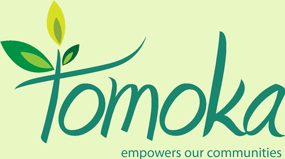
GET INVOLVED
TOGOLESE PROVERB (of the Ewe People):
Amekpela medoa kpo o -- Do not expect too much help from other people because there is a limit to their help.
In other words, everybody must learn eventually to carry his own burden.
THANK YOU FOR VISITING THIS PAGE!!!
CONTENTS
- Introduction -- A two-way traffic lane
- No donations just like that
- A growing collection of Mini Projects
- A Head Start Mini Project
- Involvement Category 1 - Mini Projects in Tomoka’s Agriculture Program
- Involvement Category 2 - Mini Projects in Tomoka’s Social / Community-development Program
- Involvement Category 3 - Mini Projects in Tomoka’s Environmental Awareness Program
- Involvement Category 4 - Mini Projects in Tomoka´s Agro-industrial Program
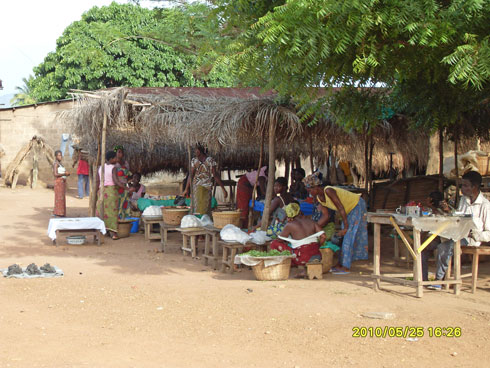 |
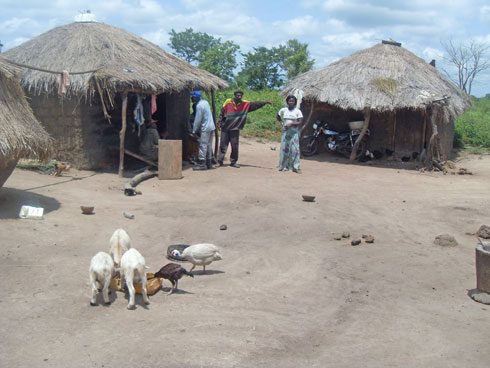 |
|||
LOCAL WEALTH: one of the two best markets in the Canton. However, most sales ladies belong to the group “petty traders” who are not organized in any way, and who have problems to make ends meet |
LOCAL WEALTH: Homestead of the relatively rich Headman of the hamlet of Avégamé, next to the Pilot Plantation. Mr and Mrs Skpane point out where their maize fields are. The motor parked in the barn, is the family’s ‘moto-taxi’ which fetches them an attractive, extra income |
|||
Introduction -- A two-way traffic lane
Welcome on this page! The fact alone that you are showing interest in our plans and activities is most encouraging for us. We need help: your help. That’s for sure. We desperately need some money – in the form of loans, donations and investments. We also need your opinions and feedback. Moreover, we need new expertise -- in all the domains which are presented on this website. But most of all, we hope that several of you are going one step further by getting involved in one way or another. As a matter of fact, we prefer to invite you in as an associate or participant! That is a most rewarding way of establishing a new supportive relationship because we want our associates and partners to enjoy our efforts and successes -- togetherwith us. And there is more to it: Gukam and the women and men of our Communities want to offer something tangible in return. It is our dream to offer our hospitality by constructing a guest house for you: as soon as possible, in our own traditional, African style but with modern amenities. There you will be able to stay in comfort, in a beautiful environment, surrounded by welcoming people with a unique culture. We, at Tomoka, think that this is an effective way of building a new “give and take” relationship between us. With that objective in mind, we hope to receive YOUR suggestions for building up such a relationship. Just contact us, and you then will discover that you have opened a two-way traffic lane.
No donations just like that
Tomoka’s Steering Committee and the Chiefs of the Community of Dawlotu Tutu have decided to present a limited number of categories of needed support. We explicitly refrain from asking donations just like that because we are not in a life threatening situation. We are surviving as it is. As you know, giving money to the poor in charity (alms) often injures the recipient’s self-respect and that is a bad start of getting ahead in life. There are much better ways of building a helping relationship.
A growing collection of Mini Projects
Tomoka has organized its interventions within the context of 4 interrelated Programmes agriculture, community development, environmental awareness, and small scale agro-industry based on the agricultural production in the Canton. While we are progressing with developing our ideas into concrete action projects, we will present several of them on this website. We start with some Mini Projects which will help us to get our activities off from the ground during the period that we are working out our promotion plans and our fund raising campaign. The relatively small projects presented below will contribute significantly to raising the population’s awareness of the fact that `change for the better is possible, and within their reach´!
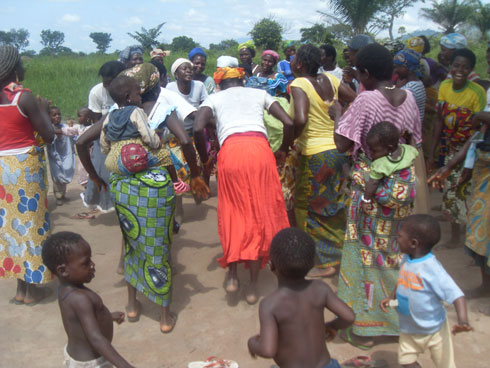 |
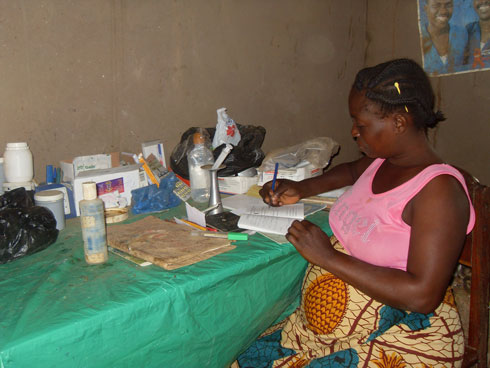 |
|||
ORGANIZED WOMEN like this one in our Project Area are hired for work on larger farms. They may serve as examples for other activities, and celebrate their togetherness like this group in Avégamé |
ORGANIZED WOMEN made sure that they could start this Birth Delivery Clinic/Pharmacy in Kpékpéta. This room witnesses about 5 births per week. Delivering ladies are attended by a traditional midwife. The complete supply of medication for the Kpékpéta Zone (9000 people) is on display on the table shown here. |
|||
A Head Start Mini Project
Motivation
First of all, we at Tomoka are looking around for a social assistant / community worker who will mobilize the people of our Rural Area on many related issues. It should be someone capable and willing to help our Project’s Steering Committee (CVD-P), women groups, rural schools and others to make realistic plans and budget proposals for sustainable improvements. We need an experienced person who speaks French, Ewé and Kabye and who links them to existing development initiatives and programmes, and who supports them also with the implementation of their plans. This implementation support has to start with the Community Projects mentioned below: in Cooperation Category B.
Tomoka’s Temporary Project Bureau is being managed and financed by GuKam’s staff. But the plans for Tomoka’s organisation include explicitly a social assistant for whom there are no funds available yet. GuKam and the Executive Board of Tomoka’s Steering Committee (CVD-P) will recruit and employ this community worker. The bi-weekly “Project Planning Meeting (PPM)” between Gukam and the Village Development Committee (CVD-P) will define the tasks, and the President of the CVD-P will be his or her daily supervisor.
Investments
The one-time, initial investments for starting up this project are F CFA 945.000 (or E 1.441 or US $ 1.746).
Annual Operational Budget
The Budget we need for a competent community worker is F CFA 2.535.000 (or E 3.859 or US $ 4.683) per year.
Our financing proposal
The Community of Dawlotu Tutu and GuKam are looking for a donor who is willing to finance this essential element of our sustainable rural development project – preferably in the form of a donation. A loan is also welcome. GuKam and the Community are willing to provide some kind of financial security, for example in the form of a mortgage on land owned in the Canton.
More details: Please, contact us
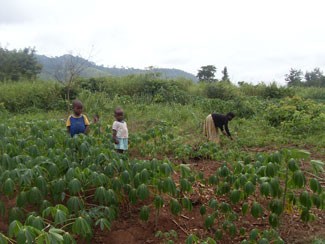 |
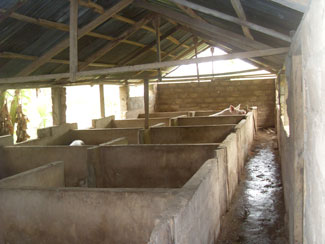 |
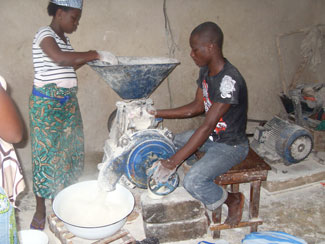 |
||
Women usually take their young children with them to the fields of their husband. Tomoka’s Insertion Plan will enable women to work on land to which they have a legal title themselves. |
Piggery owned by Mr N’tsakpe Kofi, one of the members of Tomoka’s Steering Committee in charge of the Agricultural Program. |
Tomoka will provide generators which run on home-grown Jatropha oil delivering the bio-energy for lady Maize Millers in its Women Empowerment Efforts |
||
Involvement Category 1
Mini Projects in Tomoka’s Agriculture Program
Mini Project 1.1: Cooperation with experts active within the “Jatropha System in Africa”
Motivation
The Community and GuKam could learn tremendously from the experiences accumulated in countries like Mali, Tanzania, Ghana and Mozambique. For example, GuKam has learned from the progress reports about Projects in Mozambique (published by the FACT Foundation in The Netherlands) that their community development orientation has much in common with the aims and objectives of Tomoka’s own Project. Establishing cooperation ties and obtaining expertise and advice from the FACT Foundation would help us also with the financing of several elements of our own plans.
Description
Tomoka´s Temporary Project Office is able to function better and more efficiently when it will be equipped with one more (second hand) computer, an external memory, a printer and access to Internet. This equipment would enable us to exchange useful information and to improve our documentation system.
Investments
The hardware mentioned and the subscription entry fee of F CFA 380.000 add up to a total of about F CFA 2.535.000 (= € 3.865 or US $ 4.683)
Annual Operational Budget
Monthly internet fee of F CFA 35.000, prints of key literature, depreciation, repairs and maintenance require an annual budget of about F CFA 945.000 (= € 1.441 or US $ 1.746)
Our Financing Proposal
The Community of Dawlotu Tutu and GuKam are looking for a donor who is willing to finance this essential element of our sustainable rural development project – preferably in the form of a donation. A loan is also welcome. GuKam and the Community are willing to provide some kind of financial security, for example in the form of a mortgage on land owned in the Canton.
More details: Please, contact us
 |
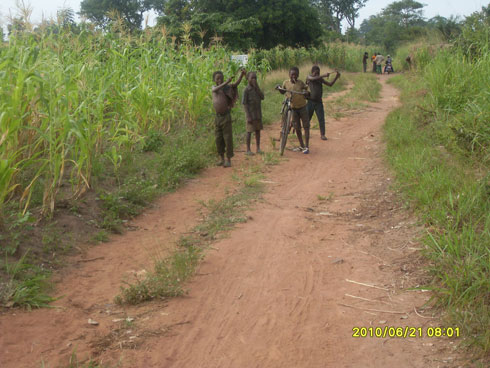 |
|||
Rural life: GuKam director Amégadzé (with basket) prepares the path for <Organizing the Farmers into Groups> for collective bargaining with the ruthless buyers from the capital. The total cash crop (maize) of a mid-size farm shown here, fetches without collective bargaining less than F CFA 150.000 = € 229 or US $ 277 |
Rural life: Children on the major road nearby the Tomoka Project Site . |
|||
Involvement Category 2
Mini Projects in Tomoka’s Social / Community-development Program
Tomoka´s Steering Committee (CVD-P) and the area’s chief Togbui Dzéto -- have collected the development ideas of Women Groups, individual farmers, teachers, youth leaders and trading women. The list which came out of several meetings is long. With the help of GuKam’s administrative support, the projects have been ranked in order of urgency. However, at this stage in the starting up of the Tomoka Project, the Project Steering Committee (CVD-P) has decided to focus first on ideas which stimulate the population to get together more in Kpékpéta, the zone’s major village. This will enable the Project to communicate more intensively and more efficiently with the farming families which are geographically spread all over the area. Communal activities are even more important when one keeps in mind that the population is composed of different ethnic groups -- each with its own language.
Mini Project 2.1: Soccer field
Motivation
The community of the Kpékpéta Zone (about 9000 inhabitants) does not have any place where people can leisurely meet. A soccer field is an excellent way of getting them together and to exchange information. There the school children and other members of the community will surely gather to play, watch and support football. Football in Togo is widely popular and it is an activity that creates unity across ages, gender and ethnic differentiations. Such a football field will create an important forum for the community to interact. Its impact will be Canton wide and even further than that. That is exactly the reason why the Tomoka Project will sponsor the First Club of Kpékpéta! The proposed Community Worker of the Head Start Project should organize this motivating small project and stimulate our women to sell some snacks and drinks to the public. Moreover, the soccer events are ideal occasions for demonstrations and explanations about issues like Jatropha Planting systems, oil pressing (with a mobile hand press), hygienic and cheap cooking on Jatropha oil, personal hygiene, the use of latrines, nutrition, preventive health care etcetera.
Description
The field will be located next to the school grounds in Kpékpéta. It will be for community and school use. The school will be responsible for maintaining the field. The community will be able to host teams from other villages in the Canton --and in future: from other places in the Region. Kpékpéta´s village development committee (each village has one!) will be responsible for overseeing the maintenance of the field. The trainer/referee and community worker proposed in the Head Start Project, will be responsible for the maintenance of clothes, shoes and equipment. Tomoka will be the first and major sponsor of the Kpékpéta Team. This will translate itself into financing goals, nets, whistles, flags for the umpires, balls & football shoes, shirts and shorts for the players, trainer and umpires. Moreover, there will be a billboard announcing the Club’s name and Tomoka as its sponsor. All major soccer events will be used for demonstrations and explanations about the Food & Bio-energy Project which makes all this possible.
Investments
The items mentioned will cost F CFA 1.500.000 (= € 2.283 or US $ 2.771)
Annual Operational Budget
F CFA 175.000 (= € 266 or US $ 323) for chalk, maintenance of the goals and balls, and replacement fund for shoes and clothes.
Our Financing Proposal
The Chief and Notables of the Kpékpéta Zone have made available a piece of land for free. The school children, teachers and parents will equalize the field, and they will build goals and perhaps also some roofing for shading important visitors. Cash Investments include a small amount for the official opening game.
Tomoka will be the local club’s First Sponsor and will pay the Investments.
Tomoka will also pay the Annual Operational Budget during three years. After that period the Football Club should have found more sponsors and income from modest entry fees and a contribution of Kpékpéta´s Community Development Fund which Tomoka is going to create. This fund will receive some income from the land rent paid by the farmers who participate in the Jatropha & Staple Food production scheme.
More details: Please, contact us
Mini Project 2.2 : Potable Water in 1 hamlet or village
Motivation
As the saying goes, ‘Water is Life’. Without easily accessible clean water, the community opts for unsafe water sources like seasonal streams and pools where water has settled after the rains. This water is always turbid. This leads to frequent bouts of diarrhoea especially among children under five, putting their lives at risk. Without water, it is impossible to maintain hygienic conditions.
The only water collection point in the Project Zone is more than two kilometres away from the Project Site, the hamlet of Avégamé. But many people have to walk more than four km. And even more problematic is the fact that the people cannot afford the prices which are being charged.
Accessible clean water leads to a lesser disease burden, saves time and money, and opens the way to larger personal productivity. It also means that during the dry season, families can cultivate crops like vegetables. This enables them to have a balanced diet everyday. At a later stage, Tomoka will organize nutrition education to sensitize the people with regards to the importance of balanced diets.
The first village receiving a well or borehole for collecting water, will be a model for other villages. Tomoka proposes to start in Avégamé, close to a rural, open air school which has been created by local subsistence farmers who also finance its functioning.
Tomoka is aware of the fact that providing clean drinking water is only one element of preventive measures which have to be taken. It has to be accompanied by vaccination programs for young children, latrines for everybody, and hygiene education. Such a comprehensive package will be worked out as soon as the Project is getting financed on levels which make this possible.
Description
The location of the well or borehole will depend on the presence of underground reservoirs. The presence of rocks and other hard soil layers will determine whether a well or borehole has to be installed.
The well will easily be accessible to all families who live nearby. Tomoka will manage it on behalf of the Community which – in line with customary land laws – should stay owner of the land and everything that is growing on or located in it. One family will be responsible for keeping the water collection point clean -- for a small fee. The Community Worker proposed in the Head Start Project will mobilize the people and organize the maintenance and cleaning responsibilities, and the `fees` to be paid by the users. The soccer events (described in Project 2.1) will be used to brief the population and to explain about hygiene and health. In case a borehole will be constructed, it will be serviced at least twice a year to ensure that appliances do not get broken or rusted thus being able to keep them functioning for many years to come.
One member of Tomoka´s Project Steering Committee (CVD-P) will be in charge of this project. In particular one of the two persons who are in charge of the “Portfolio Community Development”. Tomoka´s Temporary Project Office will supervise work and accounts.
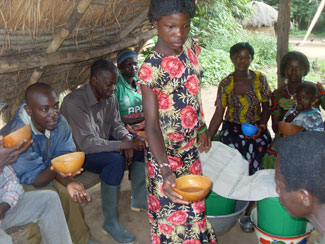 |
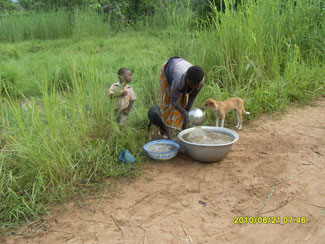 |
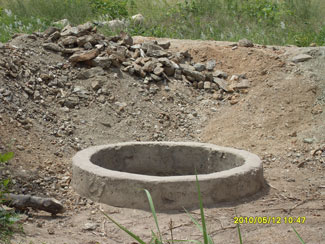 |
||
POLLUTED DRINKING WATER is used to dilute the local brew which is being served here in Avégamé. |
POLLUTED DRINKING WATER: Women who do not have enough children for the job, fetch water themselves. Here: from a mosquito invested pool, about 1,5 km away from her home in Avégamé |
CLEAN DRINKING WATER: The first borehole has been drilled by Gukam to show the population that things can be different, clean, and in their own neighbourhood |
||
Investments
One well cost F CFA 500.000 (= € 762 or US 924)
The alternative is a borehole. This will cost F CFA 2.000.000 (= € 3.049 or US $ 3.695)
Annual Operational Budget
F CFA 50.000 (= € 76 or US $ 92) -- including its cleaning & maintenance fee for the family who will be in charge.
Our Financing Proposal
Tomoka would like to receive a one time donation for the investment cost of setting up the potable water source and an operational budget for the first two years while the village prepares itself for future management of the water source. A low interest loan is also negotiable. This depends on the availability of micro credits for our farmers who want to participate in the scheme <Early Start of Increased Food Production> in August 2011. Several Women will participate in this Scheme. In other words: instead of loosing time with water fetching, they now can generate more income in their vegetable gardens and on their fields, thus being able to pay back loans and interest.
More details: Please, contact us
Mini Project 2.3 : School books and other teaching aids for the poorest elementary school
Motivation
In order to make going to school worth its while for the children and their parents, pupils need to produce good grades and parents, especially illiterate parents, must notice a change or improvement in the vocabulary or stories told by the children about their school work and in their recognizable skills, in gardening, for example. This will only be possible if the school possesses minimal teaching aids like some text books and readers. Many of our subsistence farming families are aware of this, and do not send their children to Avégamé, but make them walk up and down to Kpékpéta 4 to 6 kilometres further away! They point out that this school has “books and big pictures” to teach their children. The Avégamé school, by contrast, has no teaching aids worthwhile mentioning. At this moment, there are no books, no teaching aids worth mentioning, and no building other than a thatch roofed space……But the importance of education is acknowledged by the fact alone that it is run by two highly motivated volunteer teachers and visited by 40 to 60 children whose extremely poor parents let them go to it instead of demanding that they work on the family’s subsistence farms. This attendance figure amounts to about 50% of the children who are in the school going age.
A rural school like the one in our Project Area also needs locally produced teaching materials which disseminate knowledge about the Jatropha System and the Tomoka project which provides important impulses to the local economy. The proposed Community Worker of the Head Start Project and the Teachers should produce texts about Jatropha, bio-fuel and environmental protection aspects of the Jatropha System. The teachers moreover need teaching aids like mathematical instruments, demonstrational charts, atlases etc. In this way, school will become great fun because there is always something new to see, touch and talk about. And in the future: there will be something to eat from the school garden!
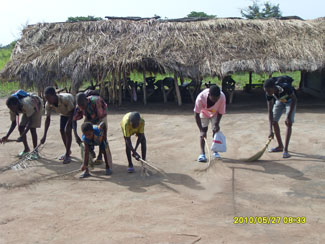 |
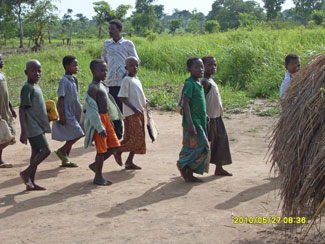 |
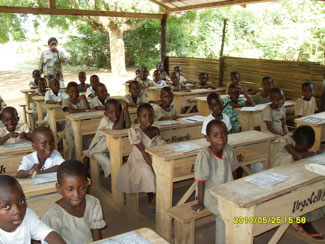 |
||
Education starts every morning with the sweeping of the school’s courtyard. About 50% of the school age children in the Project Area go indeed to school. Most of them attend schools like this one in Avégamé. It has been built by the parents |
Education is highly appreciated. The school in Avégamé has been created by the local farmers who also pay the two volunteer teachers a small compensation. |
Education in the best equipped school of the Canton. The furniture of this private school in Tutu has been donated by German children via a Church initiative |
||
Description
The school books for primary school children will have to be the text books recommended by government. Readers will be selected with a view to the limited French vocabulary of the kids who normally speak Ewé or Kabye. The proposed Community Worker will initiate and coordinate this mini project.
The locally produced teaching Aids about the Jatropha System and real atlases, dictionaries, and other teaching aids will be stored in a water proof, mobile chest which will be parked on GuKam’s neighbouring Pilot Plantation during the nights and in the weekends, until there is a better place on the school premises. The main teacher will be responsible for keeping all books in a good condition. On arrival, those books will be covered with a transparent polythene sheet to safeguard the cover.
One Member of Tomoka’s Project Steering Committee (CVD-P) with the “Portefeuille Education” will supervise this Project. Tomoka’s Temporary Project Office, managed by GuKam, will provide miscellaneous support.
Investments
We should start modestly. After all: there is literally nothing at this moment.
Any donation in cash or kind is welcome and will be used effectively.
The costs of a water proof mobile chest for teaching aids are F CFA 65.000 (= € 99 or US $ 120)
Annual Operational Budget
As starters, we propose to give the teachers a small monthly allowance of F 20.000 (€ 30 or US $ 37). We then need F CFA 480.000 per year -- (= € 732 or US $ 887). This income would enable the two teachers to contribute some time to sport and other activities of the community in the context of the Soccer Plans in mini project 2.1
Our Financing Proposal
Financing with small or large donations is welcome. Used teaching materials and books like readers are very welcome. Foreign Donors should take care of transportation cost to Lomé harbour and the clearance cost. GuKam will take care of the transport within the country, and will inform the donors about the harbour clearance cost before goods will be shipped. Since Togo uses French as its official lingua franca, all books and aids should be written in French.
More details: Please, contact us
Mini Project 2.4 : Simple training course & organization for Market Ladies: `Cost & Benefit Analysis`
Motivation
The market women are petty traders who sell their produce on market day which takes place once a week. Most of them are unable to analyse whether they make a real profit on the items they sell. They take too little notice of “invisible cost” like the time they invest in travelling, purchases and sales. Moreover, they do not make substantial investments with the profits earned. This is largely due to the fact that the money they earn on a weekly basis is not viewed by them as being the beginning of a capital for investments. They spend it ad hoc. The general trend is to spend disposable income on items like cloth to sew clothes when one’s economic status begins to improve. They lack insight in cost structures and do not yet team up for buying commodities in greater quantities, despite the fact that this would save them a lot of money. Petty traders are not aware of the advantages of teaming up in practical matters.
Description
In the absence of easily available credit facilities at a normal interest rate, our market women need courses on savings and investments, and simple accounting (book keeping) to be able to keep track of costs incurred and their net profits. They then will be able to save better and plan for investments. The Community Worker who is proposed in the Head Start Project will organize them around practical, cost saving matters like “buying in bulk”. There should be 4 training courses to the same women groups in order to ensure follow up and adaptations. These courses will have to be short and very simple and will have to take examples from real life situations in order to be understood. Initially, volunteer trainers or employees of National Programmes will be invited from the capital by the Community Worker. These trainers from far away will be hosted by the community. At a later date, a local woman or teacher will be chosen to study a trainer’s course in order to take over this job in the whole Canton. The courses will take place in the Meeting Hall of the Chief of Kpékpéta. The training course materials and some bulk quantities of tradable items (bought from a common fund) will be stored there as well.
Tomoka proposes to start a try-out with one women group in two locations. There should be no more than 7 women in each group. Members of the ‘Groupement’ which does seasonal work on ‘larger farms’ will get priority because they are already accustomed to teaming up and putting some money together in a small saving fund which is used for medical expenses (loans) of members and for an annual party.
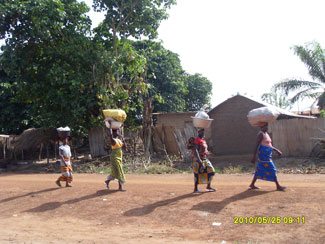 |
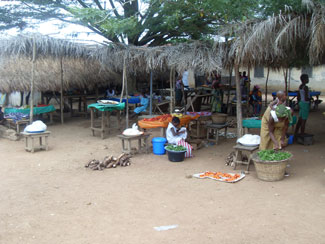 |
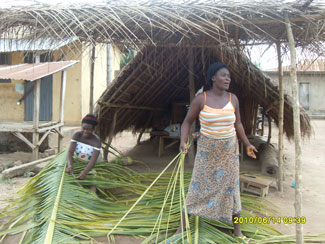 |
||
UNORGANIZED PETTY TRADERS like these ladies in our Project Area make up the greater part of Togo’s informal economy. Their profits are marginal though |
UNORGANIZED PETTY TRADERS are not aware of the advantages of teaming up in order to get more attractive prices, and do not know whether they make real profits which could be used for investments |
UNORGANIZED MAT WEVERS like these ladies in our Canton’s capital are in the same position as petty traders: they have no way of knowing whether they make a real profit or how to earn a better income |
||
Investments
A storage place and black board will cost about F CFA 150.000 (= € 228 or US $ 277).
Tomoka should lend another F CFA 150.000 to the treasurer of each group in order to help her buying items in bulk.
This adds up to a total Investment of F CFA 450.000 (= € 686 or US $ 831).
Annual Operational Budget
Writing materials, transportation of the trainers (4 times), board and lodging, and organization will cost about F CFA 300.000 (€ 457 or US $ 554)
Our Financing Proposal
Tomoka needs a donation to get this training system off the ground and for extensions during the next three years.
The work capital of F CFA 150.000 injected into each group will be supervised by the Tomoka’s Project Office until a small Community Banking system has been established. The capital itself has to be reimbursed slowly – over a period of 3 years, in weekly instalments -like Togolese Micro Finances Institutions do elsewhere. Time and Budget Management are such that a time span of one week is the maximum they can handle. However, Tomoka does not require the same exorbitant interest rates like others, but will settle for 7% per annum.
The Village Development Committee (CVD) of Kpékpéta – not to be confused with Tomoka’s CVD-P -- will finance courses like this as soon as the Jatropha Project will generate income for them. The CVD will obtain a part of the rent which the farmers will pay for the use of new land which will be planted with Jatropha and Food Crops. This will probably be the case from 2013 onwards.
Until then, we will have to depend on donations.
More details: Please, contact us
Involvement Category 3
Mini Projects in Tomoka’s Environmental Awareness Program
Mini Project 3.1: Let’s identify and protect our natural treasures….
Motivation
The Canton has lost most of its heavy forests during the last 15 years. Even valuable trees like shea and mahogany are turned into charcoal for Togo’s cities. The local communities do not benefit in any way despite the fact that most of the land and its vegetation is communally owned.
The charcoal producers move from one tree to the next and do not feel responsible for the devastation which they leave behind. And there is even more to it: the inhabitants of the region do not really see why or how they should stop this highway robbery. The multi-ethnicity of isolated areas makes it even worse because the tradition has it that the Ewé people are the real owners of the land… In other words: the other ethnicities do not feel responsible.
The uncontrolled settlement of farmers is another factor which destroys the environment. Farmers settle for a while using the slash and burn method, and move onwards when the soil gets exhausted.
Preliminary surveys carried out by GuKam personnel showed that there are still many valuable trees left. They should be protected by all means. Not only because many of them – like shea – could deliver the raw material for shea butter production by women groups. Elsewhere -- in Togo and in Ghana, for example -- this has proven to be a lucrative activity which can generate also income for Communal Funds. But there is an even more important reason for preserving the shea trees and replanting other useful trees: erosion and soil degradation can be stopped this way. And that is important in a Canton where soil and vegetation (which absorbs CO2) are the basis of the local economy.
Description
Tomoka‘s Project Steering Committee (CVD-P) would like to make an inventory of “very important large trees”. While doing so, these trees should obtain a “pictorial warning sign” informing the multi-ethnic and illiterate population that this particular tree belongs to the Community and that it is forbidden to cut it down for commercial purposes. The private use of wood is permitted as long as there is no affordable alternative source of rural energy (like Jatropha Oil) available.
Surveyors, who have received training by a Biological Expert from the capital, will make rough maps and indicate important trees and other vegetation on them. At the same time youngsters will inform the farmers and charcoal producers about what is happening and why this is happening. The fact that big trees – if they are growing on (rented or squatted) communal lands -- are owned by the community will be explained extensively. The presence of the traditional Law and Order (acknowledged by the State) has to be felt in every hook and corner of the Canton.
A community sensitisation program on environmental preservation should start simultaneously in all the schools of the Canton, and on public places like markets. The idea is that all community members should become watchdogs to ensure that big and/or useful trees are not cut anymore, except by charcoal makers who will get a licence provided by the 9 village chiefs of the canton. As long as Tomoka does not have a fully funded Project Office Team, this community sensitization program cannot yet start. And this is true also for the controlled, regulated settlement of farmers which has been worked out in Tomoka’s “Insertion Plan”.
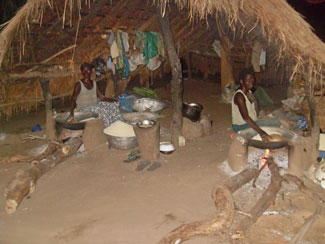 |
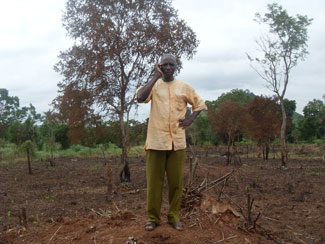 |
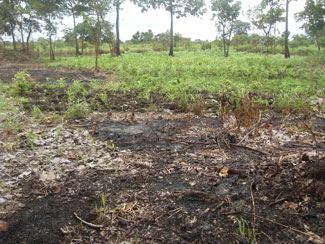 |
||
Deforestation takes frightening proportions when roasting one portion of gari takes such enormous amounts of fire wood. |
Deforestation by charcoal traders from the capital. Avegamé area is at great risk because this is one of the few places with access to a telecom network.... |
Deforestation by unregulated settling patterns. Squatters slash and burn the land, exhaust the soil, and move further.. |
||
However, the function of “Tree Inspector” will be created right away to verify compliance with the new Canton rule. In order to make an impact, this Mini Project starts with 4 uniformed functionaries with a bike at their disposal. They work in teams of 2 people. They are also charged with contacting and inviting resident charcoal makers to come to Kpékpéta in order to become organized. This is seen as the first step towards “regulated wood cutting”. These charcoal makers have to understand and agree that certain trees which are marked as such will never be cut any more, and that planting fast growing trees may provide in their future need until there will be plenty of Jatropha Oil available. That is the reason why they will be charged a small fee for obtaining a cutting licence.
Tomoka will approach the Prefect of Agou (who represents the National Authorities) with the question how compliance with the new ruling can be enforced.
Two members of Tomoka’s Project Steering Committee (CVD-P) will be in charge of this Project. We refer to the fact that two CVD-P members are responsible of the “Environment Portfolio”. Administrative Assistance will be provided by the project’s Temporary Project Office managed by GuKam. The Community Worker mentioned in the Head Start Project will organize the resident charcoal makers into a special Interest Group.
Investments
The work of a Surveyor Team which has to deliver reliable Tree Maps during one year would cost about F CFA 4.000.000 (= € 6.098 or US $ 7.390). This includes a lump sum of F CFA 900.000 for uniforms, warning signs, administrative materials, and training by a botanist or environmental specialist from the capital’s university.
The 4 new Inspectors need uniforms, a bike, administrative material, one digital photo camera per team, an external hard disc (for storing all data in Tomoka’s Temporary Project Office), and a training provided by the gendarmerie. The cost of all this is estimated to be about F CFA 1.500.000 (= € 2.287 or US $ 2.771)
The Total Investments needed are: F CFA 5.500.000 (= € 8.385 or US $ 1.161)
Annual Operational Budget
Details have not been worked out yet.
Salaries and transportation cost for four Inspectors, Meetings, Telecommunication, Youth involvement and administrative materials and support are estimated at a level of F CFA 4000.000 (= € 6.098 or US $ 7.390)
Our Financing Proposal
Tomoka and the Village Development Committee (CVD) of Kpékpéta will work out plans to finance the operational cost from future income of the Community Fund which is in the making. However, it is not realistic to assume that the Canton will be able to generate the sums mentioned during the coming 4 years. That is why Tomoka seeks assistance of private donors and Environmental Protection Organizations wherever they may be.
More details will be available from October 2010 onwards: Please, contact us
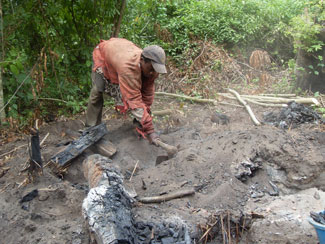 |
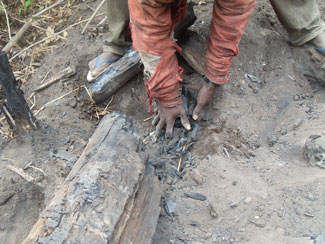 |
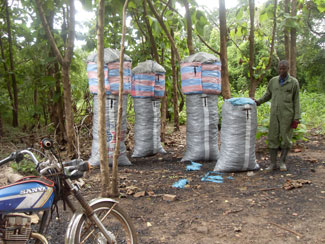 |
||
CHARCOAL vs. NATURE: One of the hundreds of charcoal makers in the Canton digs out the results of his unregulated efforts . |
CHARCOAL vs. NATURE: The next step is collecting and bagging the pieces, and then carry them to the sales point along a major dirt road. |
CHARCOAL vs. NATURE: Charcoal sales points like this one are spread all over the Canton. |
||
Involvement Category 4
Mini Projects in Tomoka´s Agro-industrial Program
Mini Project 4.1: Soap making by one women group in Kpékpéta – a Pilot Project
Motivation
Tomoka’s agro-industrial Program is perceived as an important instrument of women empowerment in the Canton. A certain percentage of the Jatropha oil which will be obtained from pressing the seeds produced on the local farms, will be reserved for the production of several varieties of “natural, handmade soaps”. GuKam has already started preparing recipes for small-scale and semi-industrial production processes.
In October 2011 there will be enough Jatropha harvest from hedges and wild plants to press a couple of thousand litres of oil. Most of it should be used for TRY-OUTS & DEMONSTRATIONS of its various applications. One of them is soap production. One existing women group in Kpékpéta will certainly join such an income generating activity. The advantage of selecting this group in particular, is the fact that it is a well-functioning organization with much experience in cooperating, sharing tasks and saving money in a collective fund. This group could become a MODEL for other groups to follow.
Description
From November 2011 onwards a Model Group of 7 ladies will concentrate on the production of two soaps which will be marketed in rural areas: washing soap powder in sachets, and toilet soap in pieces and bars. Innovative aspects like a pleasant, natural scent will be introduced to make the toilet soaps even more attractive. Tomoka will compensate the women’s loss of income while they are being trained during the first 3 months. Afterwards, they should be able to earn from the sales of their new products. In August 2011 the construction of a simple atelier and store & the purchase of tools and equipment will start to enable oil pressing in October.
In line with the increasing Oil Production which is determined by the Jatropha harvests predicted in Agricultural Scenario 4 (see downloads), more women groups will join the soap production program. Transfer of skills and experience will be taken care of by the women of the Model Group. The second group will start 6 months later than the first group.
The Community Worker mentioned in the Head Start Project will organize the introduction and adoption of this Soap Project. And Tomoka’s Temporary Project Office managed by GuKam, will provide all administrative and logistic support. This includes the acquisition of oil pressing tools and equipment like a Bieleberg hand-operated press - similar to the ones used by women groups in Mali and Tanzania. The final supervision of this mini Project is in the hands of two members of the Project steering Committee (CVD-P).
An experienced soap maker from a befriended Togolese organization is available to train her future colleagues. Such training has to include marketing, distribution and administrative (cost-benefit) aspects. That is why this trainer should be hired for the duration of one year. Eventual spare time will be used for her participation in Tomoka’s continuing experiments with soap varieties for Urban Markets and for Export.
Each women group will hire one or two male seasonal workers for the pressing of the Jatropha seeds. This choice is inspired by the fact that recruitment of men by women is an innovative aspect of women empowerment in the Canton. Its introduction will be justified with the argument that oil pressing is relatively heavy work.
Investments
Preliminary cost estimates show that investments in tools, hand press, ingredients, packaging materials, soap storage, and a shaded place / workshop will be F CFA 3.500.000 (= € 5.336 or US $ 6.466). This amount includes a lump sum of 2,3 million for the purchase of oil filters, an oil container (large enough to supply 3 women groups), a simple store for the seeds which have to be pressed, and the construction of a shaded atelier / workshop. The storage and work space aimed at will be sufficient for three women groups.
Operational Budget for the starting year
The salary for the trainer and the income compensations for two women groups (= 14 trainees during 3 months) will add up to F CFA 2.250.000 (= €3.430 or US $ 4.157).
The work capital needed per individual is estimated to be around F CFA 65.000 (almost € 100 or US $ 120). This amount will buy raw materials, packaging materials, and the rent of the atelier and its tools and equipment. This work capital will be made available in the form of a loan at an interest rate of 5% per year.
The total operational budget will be F CFA 3.160.000 (= € 4.817 or US $ 5.838)
Financing
Tomoka needs a donor to start up this soap making program.
Its sustainability is guaranteed by the fact that participating women will pay a reasonable rent for the use of Atelier, Storage and Equipment. Moreover, the loans (micro-credits) will be paid back with interest. This slowly growing rolling fund of F CFA 910.000 (14 x CFA 65.000) will be the start of Tomoka’s Community Bank.
Another factor of importance is the fact that transfer of skills to new participants will become free of charge. This has been built into the work method and does not require the services of an external trainer after the starting up period.
More details: Please, contact us
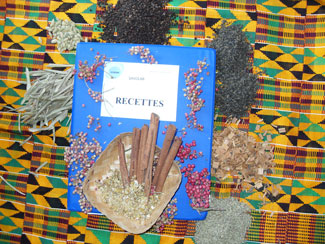 |
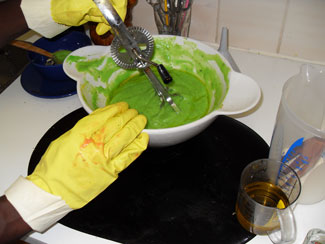 |
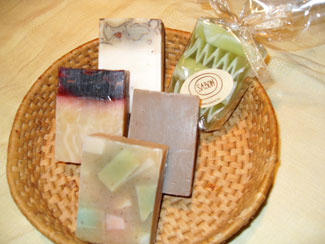 |
||
SOAP EXPERIMENTS by GuKam are focussing on handmade natural soaps based on Jatropha Oil - with or without granular additives grown in the canton itself |
SOAP EXPERIMENTS like the one shown here, are focussing on the use of natural colorants. Consumer tests will tell whether they are acceptable or not. |
SOAP EXPERIMENTS of colleagues in other developing countries have produced products which are marketed in Europe by prestigious shops. |
||
 Français
Français